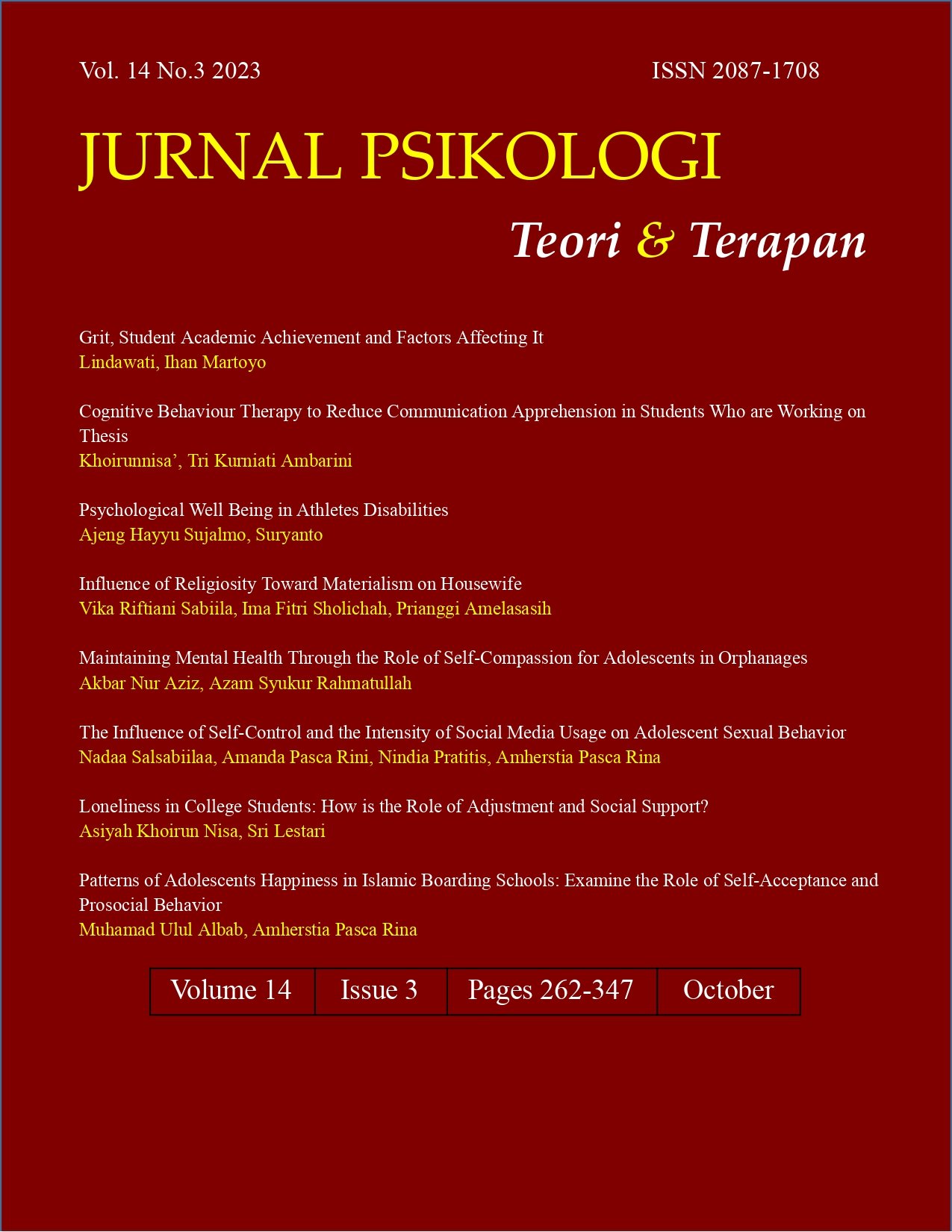Psychological Well Being in Athletes Disabilities
DOI:
https://doi.org/10.26740/jptt.v14n03.p279-289Keywords:
Athletes, Atlet, Disabilitas, Disabilities, Kesejahteraan psikologis, Psychological well beingAbstract
This study aims to determine the psychological well being of athletes with disabilities. Disabilities are individuals who have physical, mental, sensory and intellectual limitations. Sports media can help people with disabilities to develop and explore hidden potentials and talents, so that with sports media people with disabilities can have achievements. Individuals are said to have psychological well being if they have six dimensions, namely self-acceptance, positive relationships with others, autonomy, mastery of the environment, goals in life and personal growth. This study uses a qualitative approach using the intrinsic case study method. Data mining techniques used were documentation and semi-structured interviews and analyzed using theory driven thematic analysis. Participants were 2 disabled athletes. The results showed that all participants, numbering two people, had good psychological well-being, were able to accept their current situation, had independence, had life goals to achieve, were able to form warm relationships with others, were able to control their environment and were able to develop their talents and abilities. personal. The results of this study will be useful as a reference for coaches with disabilities and athletes with disabilities to find out how athletes who have psychological well being are described in life.
ABSTRAK
Penelitian ini bertujuan untuk mengetahui psychological well being pada atlet difabel. Difabel merupakan individu yang memiliki keterbatasan fisik, mental, keterbatasan sensorik dan intelektual. Media olahraga dapat membantu difabel untuk mengambangkan, dan mengeksplorasi potensi serta bakat yang terpendam, sehingga dengan media olahraga para difabel bisa memiliki prestasi. Individu dikatakan memiliki psychological well being jika memiliki enam dimensi yaitu penerimaan diri, hubungan positif dengan sesama, autonomi, penguasaan lingkungan, tujuan dalam hidup dan pertumbuhan pribadi. Penelitian ini menggunakan pendekatan kualitatif dengan menggunakan metode studi kasus intrinsik. Teknik penggalian data yang digunakan adalah dokumentasi dan wawancara semi terstruktur dan dianalisis menggunakan analisis tematik theory driven. Partisipan berjumlah 2 orang atlet difabel. Hasil penelitian menunjukan bahwa seluruh partisipan yang berjumlah dua orang memiliki kesejahteraan psikologis yang baik, dapat menerima keadaan dirinya sekarang, memiliki kemandirian, memiliki tujuan hidup yang akan dicapai, mampu membentuk hubungan yang hangat dengan orang lain, mampu mengontrol lingkungan dan mampu mengembangkan bakat serta kemampuan pribadi. Hasil penelitian ini akan bermanfaat sebagai referensi bagi pelatih difabel dan atlet difabel untuk mengetahui bagaimana gambaran atlet yang memiliki psychological well being dalam kehidupan.
References
Davis, L. S. (2019). Reducing the risk of athlete burnout: Psychosocial, sociocultural, and individual considerations for coaches. International Journal of Sports Science & Coaching, 444-452. Retrieved from https://doi.org/10.1177/1747954119861076
Erfina, T. (2018). Studi Identifikasi faktor-faktor yang mempengaruhi psychological well being pada lansia di panti jompo yayasan guna budhi bakti medan. Psikologi. Retrieved from http://repository.uma.ac.id/handle/123456789/9373
Feist, J. &. (2010). Teori Kepribadian Theories Of Personality. Jakarta: Salemba Humanika.
Kane, S. N., Mishra, A., & Dutta, A. K. (2016). Preface: International Conference on Recent Trends in Physics (ICRTP 2016). Journal of Physics: Conference Series, 755(1). https://doi.org/10.1088/1742-6596/755/1/011001
Riastri, A. B., Suryanto, S., & Noviekayati, I. (2020). Psychological Well-Being pada Mantan Penderita Skizofrenia. Jurnal Psikologi Perseptual, 5(2), 110. https://doi.org/10.24176/perseptual.v5i2.5115
Tasema, J. K. (2018). Hubungan antara Psychological Well Being dan Kepuasan Kerja pada Karyawan di Kantor X. Jurnal Maneksi, 7(1), 39. https://doi.org/10.31959/jm.v7i1.84
Downloads
Published
How to Cite
Issue
Section
License

This work is licensed under a Creative Commons Attribution-NonCommercial 4.0 International License.
Authors who publish in this journal agree to the following terms:
Copyright in any article is held by the author.
The author grants the journal, publication rights with the work simultaneously licensed under a Creative Commons Attribution License that allows others to share the work with an acknowledgment of the work's authorship and initial publication in this journal.
Authors may enter into separate, additional contractual arrangements for the non-exclusive distribution of the journal's published version of the work (e.g., posting it to an institutional repository or publishing it in a book), with an acknowledgment of its initial publication in this journal.
Authors are permitted and encouraged to post their work online (e.g., in an institutional repository or on their website) prior to and during the submission process, as this can lead to productive exchanges, as well as earlier and greater citation of published work.
 Abstract views: 1156
,
Abstract views: 1156
, PDF Downloads: 782
PDF Downloads: 782


















